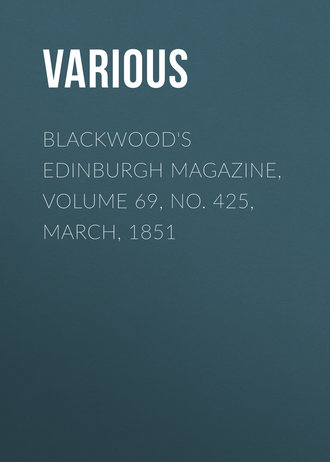
Various
Blackwood's Edinburgh Magazine, Volume 69, No. 425, March, 1851
THE DANGERS OF THE COUNTRY
NO. II. – OUR INTERNAL DANGERS
"The apparent contradiction," says the Edinburgh Review, "between the vast amount of unrelieved misery in the country, and the vast amount of energetic benevolence now existing in this country, which strikes so many with despair, inspires us, on the contrary, with the most sanguine hopes; because, in that benevolence, we see ample means of remedying nearly all our social evils, – means heretofore impotent solely because misapplied. We agree with the Socialists in holding that the world can never have been intended to be, and will not long remain, what it is. It cannot be that the same intellect which has wrung from nature her most hidden secrets, which has triumphed over the most gigantic material obstructions, which has 'exhausted worlds and then imagined new;' which has discovered and described laws operating in regions of space separate from us by a distance so vast that human imagination cannot figure it and arithmetical language can hardly express it, should not, when fairly applied to social and administrative science, be competent to rectify our errors and to smoothe our path – unless, indeed, society take refuge in the dreary creed, which shall never be ours, that the problem before us is insoluble, and the wretchedness around us inherent and incurable."1
We entirely concur in these eloquent and just observations, though the honest and candid admissions they contain sound rather strange when coming from a journal which has, for nearly half-a-century, been the most strenuous, and not the least able, supporter of the system which has terminated in these woful results. We concur with this author in thinking, that it never was intended by Providence that things in this country should be as they now are; and that it is impossible they can long continue so. Sooner or later, if the premonitory symptoms of our diseased state continue to be disregarded by our rulers, and the influential part of the nation who now determine our policy, as they have been for a great number of years back, some terrible catastrophe will arise, like that in Ireland by the failure of the potato crop in 1846, which, amidst an appalling and perhaps unprecedented amount of human suffering, is in course of rectifying many of the social evils under which that ill-starred country has so long laboured. We narrowly escaped such a catastrophe on occasion of the great monetary crisis of October 1847, by far the most serious and widespread which Great Britain has ever known; and so much was the nation in its vital resources weakened by that calamity, and so wearing-out and grievous are the causes of evil still operating amongst us, that it is much to be feared that the catastrophe we anticipate will not be deferred beyond the next of the periodical monetary crises with which the country is now so regularly afflicted.
What renders our present social condition so alarming and depressing to the contemplative mind is, that the evils which are so widespread through society have only increased with the advance of the nation in general industry, accumulated capital, and mechanical power; and at a time when universal and unprecedented exertions have been made both for the religious and moral education of the working-classes, the improvement of their habits, and the extension of their information. The most superficial observer must be aware what astonishing progress we have made since 1815. Our exports and imports have tripled – our shipping doubled2– our population advanced fully 50 per cent. Our agriculture has kept pace with this astonishing increase, insomuch that, down to the commencement of five bad years in succession, in 1836, followed by Free Trade in 1842 and 1846, our imports of wheat and flour had sunk to a hundredth-part of the food of our people. At no former period, in England's or the world's history, were such efforts made by energetic and philanthropic individuals to stem the progress of public and private disaster, or such noble and even heroic sacrifices made by the State to assuage, where it was most aggravated, the intensity of private suffering. At one period Government gave £20,000,000 to compensate the planters in the West Indies for Negro Emancipation; at another £10,000,000, to relieve the effects of famine and Irish improvidence. The efforts made in the cause of education, religious instruction, church accommodation, the relief of pauperism, the elevation of the standard of comfort, and the improvement of the habits of the poor, have been innumerable, systematic, and unwearied.
In Scotland, a new great sect of Presbyterians has grown up more suited than the Establishment to the inclinations of a large part of the people, and they have, in three years, built and provided for eight hundred new places of worship, at a cost of above £1,500,000. In Glasgow alone, thirty-two have been erected, at a cost of £107,000! besides fifteen, erected a few years before, by subscription of persons connected with the Establishment. The prodigious efforts made by the dignitaries and pastors of the Church of England, to extend the sphere and increase the utility of their Establishment, are known to all the world, and have extorted the reluctant applause even of the most inveterate of their opponents. All other religious persuasions have done the same: Roman Catholics, Methodists, Wesleyans, Dissenters of all sorts, have vied with each other in zeal and efforts to extend their respective adherents, and augment the number and respectability of their places of worship. Education has shared in the general movement; and although Government has yet done little, the number of voluntary schools established in most parts of the country almost exceeds belief. At the same time, the average poor-rates of England have for the last ten years been about £6,000,000. Scotland has got a more efficient one than the cautious administration of the old law had permitted, which already expends about £500,000 yearly on the relief of indigence: and Ireland has got a new one, which at its greatest distress expended above £2,000,000 in a year, and still dispenses upwards of £1,500,000 annually. Yet, in the midst of all this prodigious increase of national industry, religious zeal, and philanthropic activity, the condition of the greater part of our working classes has been daily getting worse, and was never perhaps, as a whole, so bad as in this year, when, in consequence of Continental pacification, Bank discounts at 2½ per cent, and a great influx of Californian gold, prices of manufactured articles have risen 20 per cent, and the great manufacturing towns are in a state of general prosperity. Ample evidence of all this will be brought forward in the sequel of this essay.
Notwithstanding all this, we do not despair either of the human race or of the fortunes and social condition of this country. We are firm believers in the doctrine, derived equally from natural and revealed religion, that the greater part of the evils, individual and social, of this life are derived from the effects of human selfishness, folly, or wickedness, and that it is sin which has brought death to nations not less than individuals. Barring some calamities which are obviously beyond the reach of human remedy – such as sickness, the death of relations or friends, and external disasters, as famine or pestilence – there is scarcely an ill which now afflicts mankind which may not be distinctly traced to human selfishness or folly in the present or some preceding generation. That God will visit the sins of the fathers upon the children is indeed as loudly proclaimed in the history of man as ever it was among the thunders of Mount Sinai. But, assuming this to be the principle of the Divine government of mankind, we are confident we are within bounds when we say that four-fifths, perhaps nine-tenths, of the social and private evils which now afflict humanity, are the direct consequences of selfishness or folly in this or some recently preceding generation. Every attentive observer of the fate of individuals or families around him must see that this is the case in private life; and a very little attention alone is required to convince one that to the same cause is to be ascribed four-fifths of the social evils, great as they are, which all feel to be now so overwhelming.
We propose, first, to establish the fact that, amidst all the boasted and really astonishing increase of our national industry, the suffering and misery of the working-classes has constantly, on an average of years, gone on increasing; and then to consider to what causes this most alarming and disheartening state of things is to be ascribed. To prove the first, it is sufficient to refer to three authentic sources of information – the records of emigration, of crime, and of pauperism, for the last twenty-eight years.
From the table given below, it appears that while, in the year 1826, immediately following the dreadful monetary crisis of December 1825, – by far the severest which had then been felt – the total emigration from the British Islands was under twenty-one thousand; in the year 1849, being the fourth year of Free Trade, and in its last six months one of great commercial activity, it had reached the enormous and unprecedented amount of THREE HUNDRED THOUSAND! In twenty-five years of almost ceaseless Liberal government, and carrying out the principles, social and political, of the Political Economists, the number of persons driven into exile had increased fifteen-fold. So extraordinary and decisive a proof of the progressive increase of suffering in a people is perhaps not to be found in the whole annals of mankind. The emigration-returns for 1850 have not yet been made up, but that they will exhibit a result not less striking and woful than the preceding years may be judged of by the facts, that the emigration from Liverpool, which in 1849 was 154,400, had risen in 1850 to 174,260; and that the emigrants who landed at New York alone, in 1850, were 212,796 – of whom 116,552 were Irish, and 28,125 English subjects, the remainder being chiefly Scotch and Germans.3
We say, and say advisedly, that this prodigious flood of emigrants were, for the most part, driven into exile by suffering, not tempted into it by hope, and that its progressive increase is the most decisive proof of the enhanced misery and suffering of the working classes. The slightest consideration of the last column of the table below4 must demonstrate this. Every known and deplored year of suffering has been immediately followed by a great increase in the number of emigrants in the next, or some subsequent years. Thus, in the year 1825, the total emigration was only 14,891; but the monetary crisis of December in that year raised it to 20,900 in the next year. In the year 1830, the last of the Duke of Wellington's administration, the emigration was 56,907; but in the two next years, being those of Reform agitation and consequent penury, these numbers were almost doubled: they rose to 83,160 in 1831, and to 103,140 in 1832. With the fine harvests and consequent prosperity of 1833 and 1834, they sank to 44,478; but the bad seasons of 1838, 1839, and 1840 made them rapidly rise again, until they became,

The Railway Mania and artificial excitement of 1843 and 1844 brought down these numbers to one half– they were 57,212 and 70,686 in these two years successively. But the Currency Laws of 1844 and 1845, and Free Trade of 1846, soon more than quadrupled these numbers; and they have never since receded, but, on the contrary, rapidly increased ever since. The numbers were: —
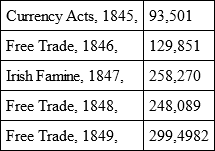
More convincing proof that emigration is, for the most part, the result of general distress, and that the intensity and wide spread of that distress is to be measured by its increase, cannot possibly be imagined.
In the next place, the criminal records for the same period, since 1822, demonstrate, in a manner equally decisive, that amidst all our advances in civilisation, wealth, and productive industry, the causes producing an increase of crime have been equally active; and that, abreast of the distress which drove such prodigious and increasing multitudes into exile, have advanced the social evils which have, in an equal ratio, multiplied the criminals among those who remain at home.
From the table quoted below, it appears that, since the year 1822, serious crime, over the whole empire, has advanced fully 300 per cent; while the numbers of the people, during the same period, have not increased more than 30 per cent, which of itself is a very great and most surprising increase for an old state. It has advanced from 27,000 to 75,000. In other words, serious crime, during the last twenty-five years, has advanced TEN TIMES as fast as the numbers of the people.5
The same table is equally valuable in another point of view, as demonstrating, that it is to a general and progressive increase of distress that this deplorable result is to be ascribed. Every year of great and general suffering has been immediately followed in the next and the succeeding ones by a sudden start in crime, which has again as regularly receded, when a returning gleam of prosperity has for a time illuminated the prospects of the working-classes in the community. Thus, the dreadful monetary crisis of December 1825 was followed next year by a considerable increase of commitments: they rose from 31,828 to 38,071. The numbers again fell to 33,273 and 36,009 in 1829 and 1830, which were years of comparative comfort. The Reform agitation, and consequent distress of 1831 and 1832, raised them again to 49,523 in 1834; while the Joint-stock mania and fine harvests of 1835 lowered it to 44,803. The bad harvests, great importation, and consequent monetary crisis of 1839 and 1840 raised them most materially; they amounted to 54,244 and 54,892 in those years respectively. The fine harvests and Railway mania of 1844 and 1845 lowered them to 49,565 and 44,536; but the Irish famine and Free-trade measures of 1846, followed, as they necessarily were, by the dreadful monetary crisis of October 1847, raised them again to an unprecedented amount, from which they have never since receded. In 1848, they were 73,780; in 1849, 74,162; of which, last year, no less than 41,980 were in Ireland, being nearly 4000 more than 1848 – albeit the harvest of 1849 was very fine, and the preceding year had been the year of the Irish rebellion, and when that country might be presumed to be still labouring under the effects of the famine of autumn 1846.
The poor's rate from 1822 to 18496 affords an equally conclusive proof of the steady increase of pauperism – varying, of course, like the crime and emigration, with the prosperity and suffering of particular years, but exhibiting on the whole a great and most portentous increase. This appears even when it is measured in money; but still more strikingly and convincingly when measured in grain – the true test both of its amount and its weight, as by far the greatest part of it is laid out in the purchase of food for the paupers, and the price of that food is an index to the ability of the land to bear it. It is to be recollected that the new Poor Law, which was introduced to check the rapid and alarming increase in the poor's rates of England and Wales, was passed in 1834, and came into full operation in 1835, and has since continued unaltered. It certainly effected a great reduction at first; but that it was not lasting, and was speedily altered by the Free-Trade measures, is decisively proved by the following table, furnished by Mr Porter. The in-door and out-door paupers of England since 1840 have stood thus to 1848: —
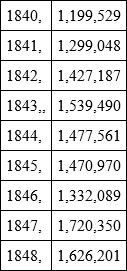
– Progress of the Nation, 3d Ed. p. 94.
These are the results exhibited in England and Wales. The poor's rates since 1837 have doubled in real weight, and we need not say that they are calculated to awaken the most alarming reflections; the more especially when it is recollected that the year 1849 was one of reviving, and, during its last six months, of boasted commercial prosperity. But the matter becomes much more serious, and the picture of the social condition of the island much more correct and striking, when the simultaneous measures, adopted during the last five years in Scotland and Ireland, are taken into consideration.
We need not tell our readers that, prior to 1844, Ireland had no poor law at all; and that although Scotland had a most humane and admirable poor law on its statute-book, yet its operation had been so much frittered away and nullified, by the unhappy decision of the Court of Session, which gave no control to the local courts over the decisions of the heritors and kirk-sessions (church-wardens of parishes), thereby in effect rendering them judges without control in their own cause, that it, practically speaking, amounted to almost nothing. But as the evils of that state of things had become apparent, and had been demonstrated luce meridianâ clarius, by Dr Alison and other distinguished philanthropists, an efficient statute was passed in 1845, which corrected this evil, and has since produced the following results, which may well attract the notice of the most inconsiderate, from the rapid increase which pauperism exhibits, and the extraordinary magnitude it has already attained in Scotland —
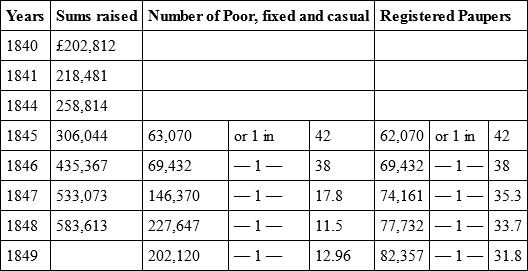
– Poor-Law Report, Scotland, Aug. 1849.
In the year 1850, a year of unusual commercial prosperity, the sums assessed for the relief of the poor in Glasgow alone, irrespective of buildings and other expenses connected with them, was £87,637, and with these expenses £121,000.7
In Ireland, the growth of the Poor Law, from its first introduction, has been still more rapid and alarming, as might have been anticipated from the greater mass of indigence and destitution with which it there had to contend. The sums raised for relief of the poor in that country, the nominal rental of which is £13,000,000, has stood thus for the last three years —
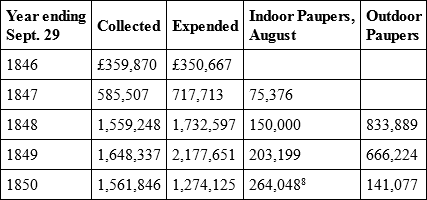
– Third Annual Report, Ireland, p. 7.
8 On 22d June, 1850.
On 3d July 1847, no less than 3,020,712 persons were fed by the public in Ireland, being about 40 per cent on the whole population – certainly, at that date, under 8,000,000. Well may the Edinburgh Review say, in reference to this astonishing subject —
"The collection in the year 1847-8 is remarkable: three times the amount of the collections of 1846-7, five times the amount of the collections of 1845-6. A tax unknown in Ireland ten years before was levied in the Year 1848 to the extent of one-ninth of the rateable property of the country, and that in a period of unprecedented depression and embarrassment. In the same year the expenditure had risen 150 per cent above that of 1847, and 500 per cent above the expenditure of 1846. The expenditure in 1848-9 exceeds that of 1847 by the large sum of £445,054."9
The diminished expenditure of 1850 is mainly owing to the reduction in the price of provisions in that year, which has caused the cost of an in-door pauper to decline from 2s. 2d., which it was in April 1847, to 1s. 2d., or nearly a half, to which it fell in autumn 1849, which it has never since exceeded. Measured by quarters of grain, the poor's-rate of Ireland, in 1850, was fully twice as heavy as it was in 1848, when the effects of the disastrous famine of 1846 were still felt.
After these broad and decisive facts, drawn from so many official sources, and all conspiring to one result, it may seem unnecessary to go further, or load these pages, for which matter abundant to overflowing still remains, with any farther proof or illustration of a thing unhappily too apparent. But as our present system is mainly calculated for the interests of our great manufacturing cities, and, at all events, has been brought about by their influence, and is strictly in conformity with their demands, we cannot resist the insertion of an extract from an eloquent speech of a most able, humane, and zealous minister of the Free Church in Glasgow on the moral and religious state of the working-classes in that vast and rapidly-increasing city, which now has little short of 400,000 inhabitants within its bounds.
"I know," said Dr Paterson, "that many congregations, not of the Free Church, both feel and manifest an anxious and enlightened concern in this cause. I do not attempt to describe their efforts, simply because I am not in a position to do them justice. I hail them, however, as fellow-labourers. I rejoice to know that they are in the field to some extent already, and I shall rejoice still more to see their exertions multiplying side by side with our own. Certain I am that nothing short of a levy en masse of whatever there is of living Christianity in the city, in all the branches of the Church of Christ which it contains, will suffice to make head against the augmenting ignorance and ungodliness, and Popery and infidelity, with which we have to deal. My other observation is for the members of our own church. Some of them will, perhaps, be startled by this movement, simply because it in adding another to our already numerous schemes – and because it may aggravate the difficulty we already feel of carrying them on. Here, they may say, is the beginning of new demands upon both our money and our time. To such a complaint I have no other answer to make but one – but it is one that seems to me to be decisive. My answer is, that this movement, whatever it may cost, is a matter of life and death. If we do not destroy this evil, it will destroy us."
These are certainly strong expressions, but they come from one well acquainted, from personal visitation in his parish, which is one of the most densely peopled in Glasgow, and second to none in zeal and ability to combat the enormous mass of destitution, crime, sensuality, and civilised heathenism with which he has to deal. And that he does not exaggerate the evil, and speaks from accurate information, not vague imagination, is evident from the details which he gives.
"I begin with the Old Wynd, which is the western boundary of the parish, and of which only the one side, therefore, is in the Tron parish. That one side contains 102 families and 504 individuals. Among that population there are possessed in all only 11 church sittings, or little more than 2 to the 100. Of the 102 families, only 14 profess to be in the habit of going to any place of worship. In the New Wynd, there are 350 families and 1976 individuals, possessing in all 66 church sittings, or little more than 3 to the 100. Of the 350 families, only 67 profess to be in the habit of attending any place of worship. Lastly, the Back Wynd contains 137 families and 752 individuals, who possess in all only 6 church sittings, or less than 1 to the 100! Of these 137 families, only 13 profess to attend any place of worship. Here, then, in these three Wynds, constituting but a section of the parish, we have a population of 3232 individuals, with only 83 church sittings, or little more than an average of 2½ to the 100. Of the 589 families of which that population consists, the enormous number of 495 families, by their own confession, are living in habitual and total estrangement from the house of God. In these appalling circumstances, it will not surprise the presbytery to learn, that in the whole of the three Wynds there were found no more than 117 Bibles – in other words, that scarcely one family in five were possessed of a copy of the Word of God."
Again he says —
"During the first ten of the last thirty years – that is, from 1821 to 1831 – the population increased at the rate of about 5000 a-year. During the second ten of these years – that is, from 1831 to 1841 – it increased at the rate of 8000 a-year. During the third ten of these years – that is, from 1841 to 1851 – it is believed, on good grounds, that the increase will average 12,000 a-year. Let any man consider these facts, and then, if he has courage to look forward at all, let him try to picture to himself the state of Glasgow when another thirty years shall have run their course. If the same ratio of increase holds on – and I know of no good reason for doubting that it will – we shall have in thirty years a population nearly equal in numbers to that of Paris; and most assuredly, if the Christian churches do not speedily arouse themselves, it will be by that time like Paris in more respects than one. We may have the numbers of the French capital, but we shall have their infidelity, their Popery, their licentiousness, and their lawlessness too. If our efforts did not keep pace with a population growing at the rate of 5000 a-year, how are such efforts to do alongside of a population growing at the rate of from 12,000 to 15,000 a-year? If in the race of the last thirty years we fell at least twenty years behind, how tremendously and how ruinously shall we be distanced in the next thirty years to come! 'If thou hast run with the footmen, and they have wearied thee, then how canst thou contend with horses! And if in the land of peace, wherein thou trustedst, they wearied thee, then how wilt thou do in the swellings of Jordan!'"
We select this as a picture of our great manufacturing towns, in which the greatest and most unbounded prosperity, so far as mere production goes, has prevailed, generally speaking, for the last thirty years; in which the custom-house duties have increased, since 1812, from £3000 a-year to £660,000, and the river dues from £4500 to £66,000 in the same period; but in which the sums expended in poor-rates and pauper burials were, in round numbers, —
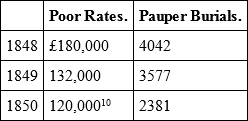
10 Including buildings £87,000; for poor alone.
Indicating the deplorable destitution of multitudes in the midst of this growing wealth and unparalleled increase of manufacturing and commercial greatness. In the last year, out of 10,461 burials, no less than 2381, or nearly a fourth, were at the public expense.11
Of the wretched condition of a large class of the operatives of Glasgow – that employed in making clothes for the rest of the community – the following striking account has been given in a recent interesting publication on the "Sweating System," by a merchant tailor of the city: —
"The out-door or sweating system, by which the great proportion of their work is produced, has had a fearful debasing effect on journeymen tailors. Work is given out to a person denominated a "middle-man." He alone comes into contact with the employer. He employs others to work under him, in his own house. The workmen have no respect for him, as they have for an ordinary employer; nor has he the slightest influence over them, in enforcing proper conduct or prudent habits. On the contrary, his influence tends only to their hurt. He engages them to work at the lowest possible prices– making all the profit he can out of them. He ordinarily sets them down to work in a small, dirty room, in some unhealthy part of the city. They are allowed to work at irregular hours. Sunday, in innumerable instances brings no rest to the tailor under the sweating system; he must serve his slave-driver on that day too, even if he should go idle on the other days of the week. No use of churches or ministers to him; his calling is to produce so-called cheap clothes for the million– Sunday or Monday being alike necessary for such a laudable pursuit, though his soul should perish. Small matter that: only let the cheap system flourish, and thereby increase the riches of the people, and then full compensation has been made, though moral degradation, loss of all self-respect, and tattered rags, be the lot of the unhappy victim, sunk by it to the lowest possible degree."12
Such is the effect of the cheapening and competition system, in one of our greatest manufacturing towns, in a year of great and unusual commercial prosperity. That the condition of the vast multitude engaged in the making of clothes in the metropolis is not better, may be judged of by the fact that there are in London 20,000 journeymen tailors, of whom 14,000 can barely earn a miserable subsistence by working fourteen hours a-day, Sunday included; and that Mr Sidney Herbert himself, a great Free-Trader, has been lately endeavouring to get subscriptions for the needlewomen of London, on the statement that there are there 33,000 females of that class, who only earn on an average 4½. a day, by working fourteen hours. And the writer of this Essay has ascertained, by going over the returns of the census of 1841 for Glasgow, (Occupations of the People,) that there were in Glasgow in that year above 50,000 women engaged in factories or needle-work, and whose average earnings certainly do not, even in this year of boasted commercial prosperity, exceed 7s. or 8s. a week. Their number is now, beyond all question, above 60,000, and their wages not higher. Such is the cheapening and competition system in the greatest marts of manufacturing industry, and in a year when provisions were cheap, exports great, and the system devised for its special encouragement in full and unrestrained activity.
Facts of this kind give too much reason to believe that the picture drawn in a late work of romance, but evidently taken by a well-informed observer in London, is too well founded in fact: —
"Every working tailor must come to this at last, on the present system; and we are lucky in having been spared so long. You all know where this will end – in the same misery as 15,000 out of 20,000 of our class are enduring now. We shall become the slaves, often the bodily prisoners, of Jews, middle-men, and sweaters, who draw their livelihood out of our starvation. We shall have to fare as the rest have – ever decreasing prices of labour, ever increasing profits, made out of that labour by the contractors who will employ us – arbitrary fines, inflicted at the caprice of hirelings – the competition of women, and children, and starving Irish – our hours of work will increase one-third, our actual pay decrease to less than one-half. And in all this we shall have no hope, no chance of improvement in wages, but even more penury, slavery, misery, as we are pressed on by those who are sucked by fifties – almost by hundreds – yearly out of the honourable trade in which we were brought up, into the infernal system of contract work, which is devouring our trade, and many others, body and soul. Our wives will be forced to sit up night and day to help us – our children must labour from the cradle, without chance of going to school, hardly of breathing the fresh air of heaven – our boys, as they grow up, must turn beggars or paupers – our daughters, as thousands do, must eke out their miserable earnings by prostitution. And after all, a whole family will not gain what one of us had been doing, as yet, single-handed. You know there will be no hope for us. There is no use appealing to Government or Parliament."13
We shall only add to these copious extracts and documents one illustrative of the state to which the West Highlands of Scotland have been brought by Free Trade in black cattle and barilla, the staple of their industry: —


